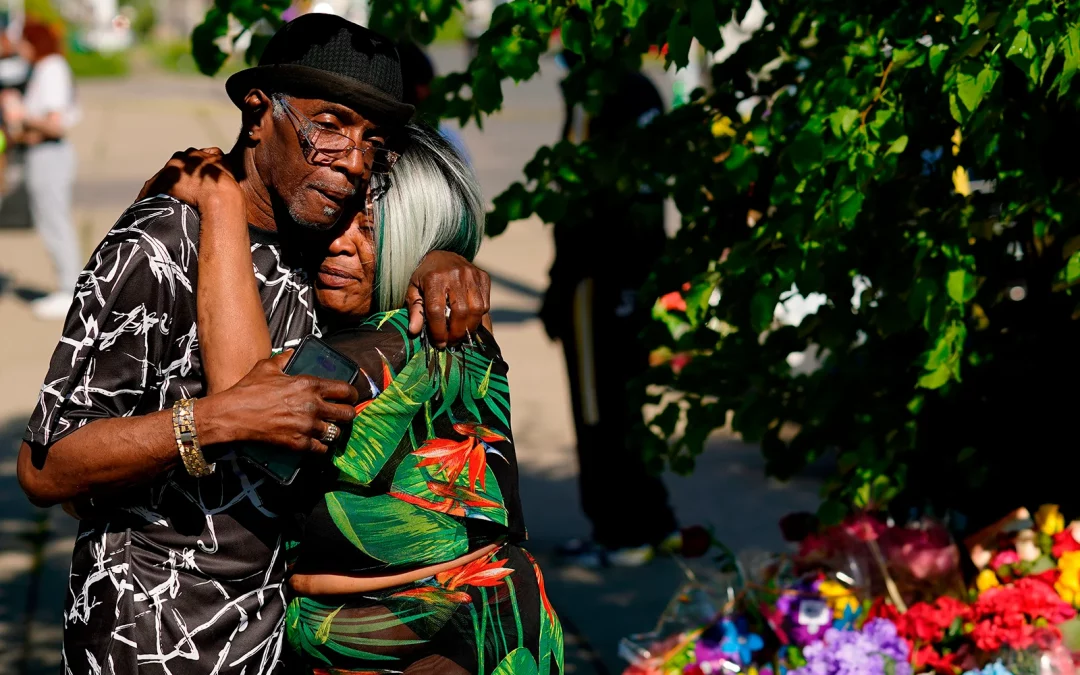
by Adelle M. Banks, RNS | May 18, 2022 | Headline News, Social Justice |
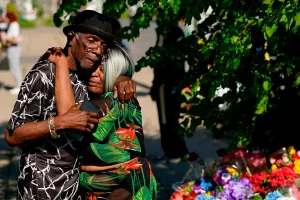
(RNS) — Soon after a white 18-year-old shooter targeted Black customers of a community grocery store in Buffalo, New York, on Saturday (May 14), the Rev. Denise Walden, executive director of Voice Buffalo, a social justice and equity organization, was coordinating clergy to offer grief counseling and help families immediately and, she hopes, for the foreseeable future.
She was also grieving personally: She knows the families of most of the 10 people killed in the massacre.
“This is going to take more than a week, more than a month, more than six months,” said Walden, a member of the clergy team at First Calvary Missionary Baptist Church, a predominantly Black congregation in Buffalo. “We need long-term solutions and support.”
Walden’s 25-year-old organization is a local chapter of Live Free, a Christian organization that has in recent years focused on preventing community violence, which now has new questions to answer, Walden said, about “the hate that caused this person to come into this community and create such a horrible, violent violation to our community.”
She said more resources are needed to counter hate in general and to cope with the reaction from Buffalo’s Black community. “When tragedy strikes and those things are not in place,” Walden said, “we create an environment that can become even more dangerous because people don’t know what to do to process their grief and their trauma.”
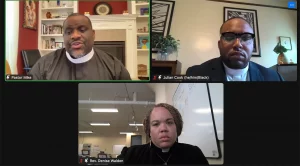
Walden, 42, spoke with Religion News Service about her connections to the people who died on Buffalo’s East Side, who the community has lost and what it needs now.
The interview has been edited for length and clarity.
The massacre on Saturday occurred at a grocery store in your neighborhood. How did you react to the violence that happened there?
I’m a seven-minute walk away from the grocery store. It’s our community store. We’re there regularly. As far as how I reacted, I think I’m still trying to figure that out. For me it was, how do I show up with and in my community, just being a resource and, hopefully, a person to bring some peace and love that are all much needed in this time. And just being as comforting to those who are closest to the pain from this as possible.
You were one of the officiants of a vigil on Sunday outside the Tops grocery store. What words did you find to say?
It was hard. I think we know that there’s a need for comfort. There’s a need for love in our community. And that was the word, reminding people that we are still a strong community; reminding those of us that live here that in spite of this heinous act that we’ve seen, this is still home. This is our home.
You helped notify family members of those who were killed. Was that an unexpected responsibility or have you done that in the past?
That is definitely an unexpected responsibility. I’ve done little bits of it in my clergy capacity. For our organization it’s completely different and completely new. And I’ve never had to show up that way in something so tragic, and also something that is so closely impacting me as well.
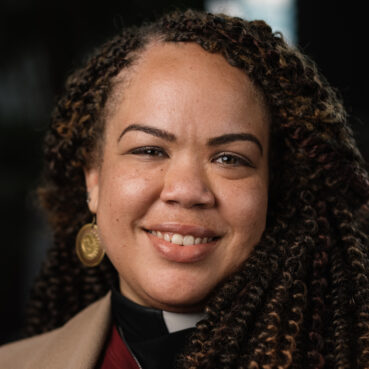
The Rev. Denise Walden. Photo via Voice Buffalo
It must have been very difficult.
Difficult doesn’t even describe it. I don’t think that there are words that can describe what was felt by these families and especially when our community is already in such a deep period of grief just still coming out of the pandemic. And then to now have loved ones ripped away from (them) so violently. That’s very difficult news to deliver to anybody.
Some of those lost have been described as church mothers or community mothers and a deacon — people who may have helped others cope when something like this happens in their community.
They are some of the matriarchs and the pillars of our community. They will be missed in ways that I don’t think I can do justice to describing, but who bring joy to this community. They’re the ones who help stand and hold this community together. Check those of us that need to be checked when we need to be checked. They are such an instrumental part of our community. I know some of them have snatched up my kid, like, “Hey, young man, get it together.” That is a huge loss to our entire community.
How will faith leaders address the mental health needs that there are now?
One of the asks that Voice and our partners have been consistently making is for culturally responsive services — people who understand there is some generational trauma here. People that they can feel a sense of community and trust with. There are very big cultural dynamics at play here. We’re working really hard to coordinate faith effortsalongside mental health providers and we’ve had a call out for faith leaders who are also licensed in providing (such) services.
Is that clergy of color who would understand some of the cultural and long-term dynamics here?
Yes, that can do grief counseling, trauma, counseling, all of those typesof things. But we’ve also put out a call to clergy to just be a presence in this community. Just be a presence of peace, a presence of comfort, a presence of love in this community. Because at the end of the day, that’s what’s going to help us start to process. That’s what’s going to help us start to heal.
Before the shooting, what were you planning to do this week?
I was getting ready to go to my sister’s graduation. She’s graduating with her second master’s degree and with honors. We were planning a great family Saturday to just all be together before I was leaving out of town. (But) I need to be here with my family. That’s my actual family, my husband and my children, but I also need to be here with my family that is my community. And so, for that reason, I won’t be traveling, and I’m grateful because she understands.
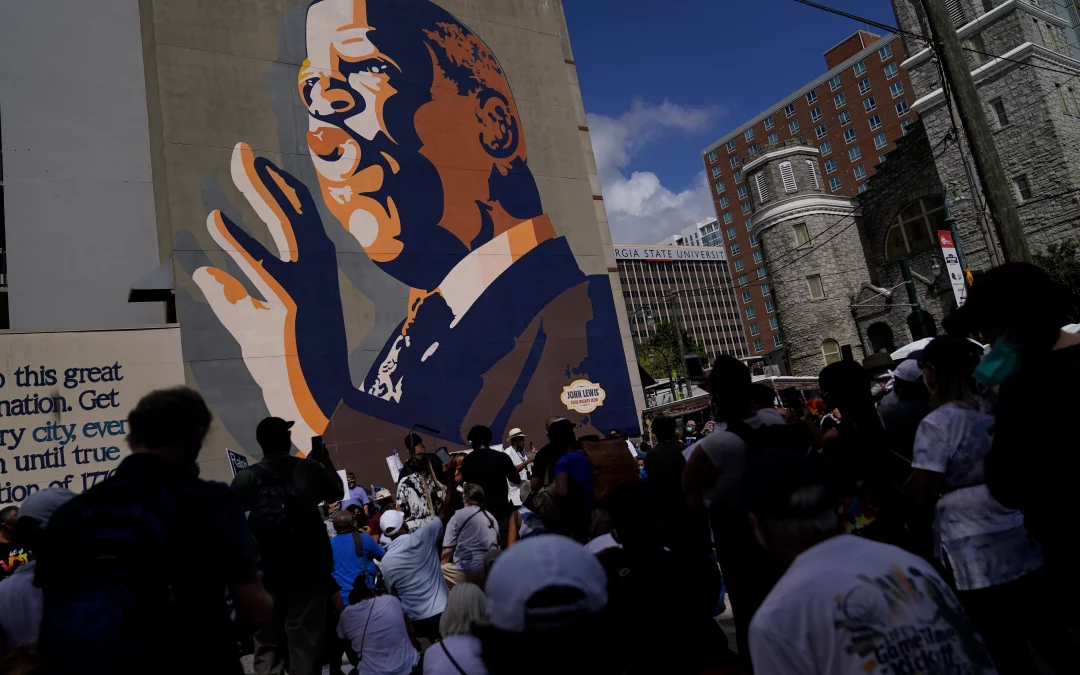
by Bridget Moix | Mar 23, 2022 | Commentary, Headline News, Social Justice |
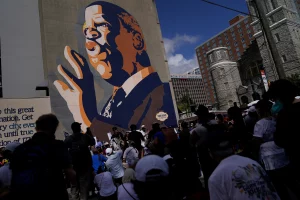
(RNS) — Millions of Texas voters headed to the polls earlier this month in the state’s primary elections — but the democratic system they participated in is markedly different from the recent past.
After last year’s enactment of sweeping voting restrictions by the Texas Statehouse, the primaries served as a first chance to see how damaging these laws would truly be. It’s too soon to get the full picture, but early signs are ominous: Roughly 30% of absentee ballots cast were rejected by election officials, a massive increase from the 2020 general election when fewer than 1% of ballots met the same fate.
Regrettably, this is likely a mere preview of what’s to come for millions of voters across the nation. In 2021, at least 19 states passed 34 laws restricting access to voting. This includes limiting mail balloting, purging voter rolls and reducing poll hours on Election Day. More than 440 bills with provisions that restrict voting access were introduced in 49 states in the 2021 legislative sessions and more are certain to come.
This isn’t just about who will or will not be able to vote in elections. When combined with the toxic partisanship that is dividing our country — and the fact that large portions of our population and numerous elected leaders still cast doubt on the outcome of the 2020 presidential election — an undeniable truth emerges: Our democracy is in deep peril.
As the first registered religious lobbying organization in the United States, we at the Friends Committee on National Legislation believe civic engagement of all people is vital to the democratic life of our country. This begins with the fundamental right to vote. Quakers and other people of faith understand that voting is not just a basic civic right but a moral requirement. At the center of our faith is the unwavering belief in and commitment to the equality and dignity of every human being. Safeguarding the integrity of the voting process for all people and removing, not raising, barriers to the full participation of disenfranchised people in our electoral process is vital to our democracy and our integrity as a nation.
What happened in Texas and in other states violates our democratic principles and our moral conscience. We know voters of color are most directly impacted by efforts to suppress their voice, both historically and today. These communities are also leading the voting rights movement, often at great personal risk. This is only the latest chapter in a long struggle against disenfranchisement of Black and brown communities in the United States. Our faith calls us to help uproot racism and discrimination wherever it exists, including at the ballot box, and to help transform our nation into the beloved community we envision.
This call to protect elections as the bedrock of democracy is not new. Earlier this year, in anticipation of Martin Luther King Day, advocates launched a large scale effort to pass the Freedom to Vote: John R. Lewis Act. This bill would revitalize American democracy by making elections more accessible, secure and transparent, and by ensuring that states do not pass discriminatory laws that restrict access to the ballot box. The effort failed due to a filibuster but has not been abandoned.
Even as Congress rightly focuses on the crisis in Ukraine and the president’s economic agenda, voting rights must remain a top priority for the nation. Currently, efforts to reform the Electoral Count Act of 1887 have real momentum in Congress, with a bipartisan group of senators working to find common ground.
This alone will not end all voter suppression, but it could be a successful vehicle for additional necessary reforms, including amendments to prevent state legislatures from overturning election results, making Election Day a holiday, supporting small-donor financing, instituting gerrymandering reforms or making absentee/vote-by-mail easier.
And despite the failed vote, senators should keep pushing for the Freedom to Vote: John R. Lewis Act. History has taught us the advancement of voting rights has never come quickly or easily — and raising the moral conscience of our nation on these issues is an important role of the faith community.
Quakers believe our democracy can live up to its potential only if the government safeguards the integrity of the voting process and ensures full participation for all people. The push for voting rights is a moral imperative and requires the urgent passage of nationwide voting rights legislation. Advocates and people of faith won’t rest until real action is taken. The Senate shouldn’t either.
(Bridget Moix is the fifth general secretary of the Friends Committee on National Legislation in its 80-year history. She brings with her more than 25 years of work in peacebuilding. Moix also leads two other Quaker organizations: Friends Place on Capitol Hill and the FCNL Education Fund. The views expressed in this commentary do not necessarily reflect those of Religion News Service.)
by Adelle M. Banks, RNS | Feb 22, 2022 | Commentary, Faith & Work, Headline News |
WASHINGTON (RNS) — The Rev. Melech E.M. Thomas attended two seminaries and graduated from the second, a historically Black theological school, in 2016.
That academic journey has put him in the pulpit of an African Methodist Episcopal Church in North Carolina.
But his pursuit of a Master of Divinity degree also left him about $80,000 in debt.
“The tuition was less, but I still had to live,” he said, describing other seminary-related costs after his transfer from Princeton Theological Seminary to the Samuel DeWitt Proctor School of Theology at Virginia Union University. “I’m in seminary full time. And I got to make sure I’m paying rent, that I’m eating, all those other expenses.”
Thomas traveled to the nation’s capital in early February for a meeting with other graduates, leaders and students of Black theological schools to discuss possible solutions for the disproportionately high debt of Black seminarians.
Delores Brisbon, leader of the Gift of Black Theological Education & Black Church Collaborative, said it’s important for leaders to understand the sacrifices being made by students who pursue seminary degrees in historically Black settings.
“We need to address this issue of debt,” she said, opening the collaborative’s two-day event, “and determine what we’re going to do about it.”
According to data from the Association of Theological Schools, debt incurred by Black graduates in the 2019-2020 academic year averaged $42,700, compared with $31,200 for white grads.
Data shows 30% of Black graduates in the 2020-2021 academic year had debt of $40,000 or more, compared with 11% of white graduates.
Thomas, 34, said his debt, necessary to achieve his degree and gain ordination, has led to a church appointment that “pays me enough to pay rent,” but not his other living expenses. Yet, Thomas said he knows he’s in a better situation than some other graduates of historically Black seminaries.
“I’m grateful,” he said. “But it’s extremely tough.”
The collaborative includes five Black theological schools — Hood Theological Seminary, Interdenominational Theological Center, Payne Theological Seminary, Samuel DeWitt Proctor School of Theology and Shaw University Divinity School. Lilly Endowment Inc. has given three grants between 2014 and 2020 totaling $2.75 million to the In Trust Center for Theological Schools to help facilitate coordination and increased mutual support between the schools, including the recent meeting about student debt.
The Rev. Jo Ann Deasy, co-author of a 2021 report on the ATS Black Student Debt Project, told the dozens gathered at a Washington hotel that the project came about as researchers discovered how “Black students were just burdened by debt more than any others.”
She said ATS is seeking to help change perceptions about what the project calls the “financial ecology of Black students” as seminarians seek training to become religious leaders, churches hope to hire them and theological institutions consider expanding financial networks to aid them.
“We’re trying to help people shift their understanding of finances from really individual responsibility to a broader systemic understanding of how finances operate in our communities and in our churches,” she said. “This is just a part of that shift toward understanding that it’s not the students’ fault but that this is a bigger issue that we need to address together.”
The report described “money autobiographies” of students who sought financially stable circumstances as they attended theological schools, whether historically Black, white or multiracial.
“They noted the disparities in financial support, particularly from congregations and denominations, between themselves and their White colleagues, a disparity that was often not seen or acknowledged by their peers or the institutions they attended,” the report states.
The average annual tuition for an M.Div. — before any scholarships are considered — is $13,100 for free-standing Protestant schools and $12,500 for Protestant schools related to a college or university. Chris Meinzer, senior director and COO of ATS, said that, on average, it takes students about four years to complete an M.Div. degree.
Seminary graduates who attended the Washington event spoke of having few scholarship options and having to take out loans to pay for expenses including or beyond tuition.
“It’s the cost of being enrolled and the cost of student fees along with your books,” said the Rev. Jamar Boyd II, senior manager of organizational impact at the Samuel DeWitt Proctor Conference, which supports African American ministries. Depending on the class and the number of books required, it could amount to as much as $600 to $700 in a semester, said Boyd, 27, a graduate of Virginia Union University’s theological school.
“If you’re a full-time student taking three or four classes, that’s a paycheck,” he said.
Minister Kathlene Judd, a theologian in residence at an Evangelical Lutheran Church in America congregation in North Carolina, said she eventually chose debt over the mental stress of working, studying and supporting a family at the same time.
She worked in information technology as she went through seminary and continues that career as she pays off her debts after originally hoping to pay for seminary without taking out loans.
“If I’m being fully transparent, I had no idea what I was getting myself into,” said Judd, 38, who graduated from Shaw University Divinity School in 2020.
She said it was a “big decision” to borrow money to continue the education she felt God called her to pursue.
“But honestly, it came down to my mental and emotional health,” she said.
Many students and grads, like Judd, are at least bivocational.
The Rev. Lawrence Ganzy Jr. is in his fourth year at Hood Theological Seminary, where he attends a track that allows him to pastor an African Methodist Episcopal Zion Church in South Carolina while taking classes on Friday nights and Saturdays. During the week, he’s an admissions officer for Strayer University.
Prior to seminary, his work through the Carolina College Advising Corps, a government program for University of North Carolina-Chapel Hill graduates to counsel low-income high school students, helped him afford the start of his theological studies.
“That paid for my first year of seminary,” said Ganzy, 26. “Then when I got to the next year, that money was gone.”
Keynoting the opening night of the collaborative meeting, the Rev. Michael Brown, president of Payne Theological Seminary in Wilberforce, Ohio, pointed to the portion of the Lord’s Prayer that says “forgive us our debts as we forgive those who are indebted to us” in the Gospel of Matthew.
“Debt keeps us chained to the past and it doesn’t open up possibilities for the future,” he said, “and so the idea of the forgiveness of debt in the Lord’s Prayer is that it releases you to do things for God.”
During the event, graduates spoke of the additional financial struggles they faced, such as debt affecting their credit scores as they try to purchase a car and escalating rent, sometimes in historically Black neighborhoods that have been gentrified.
Brisbon pointed out that Black theological schools may have small endowments and may not get support from their alumni, in part because of the often-lower salaries received by their graduates.
“Black preachers may love their school as much as somebody else but they can’t give money that they don’t have,” she said.
The ATS report noted that a 2003 Pulpit & Pew study found that, on average, Black clergy salaries were about two-thirds those of white clergy. In a 2019 Christian Century essay, scholars noted that a study by the Samuel DeWitt Proctor Conference found that one-third of Black pastors believed they were “fairly and adequately compensated as a professional” while 67% said that they had “particular financial stress” at that current time.
The Rev. Leo Whitaker, executive minister of the Baptist General Convention of Virginia, told Religion News Service that some clergy in the more than 1,000 churches in his Black state denomination are often “bivocational if not trivocational” to make ends meet, especially when they are located in a region like the state’s Northern Neck rather than the city of Richmond.
Whitaker suggested to collaborative members that they look to U.S. government programs that offer debt forgiveness to educators and doctors who serve in needy communities, noting they should offer the same for seminary grads. He hopes collaborative members will discuss his idea with seminary and education officials.
“You’re serving a stressed community and you’re financially stressed yourself without the ability to make the necessary funds and it’s not about them having a choice of where they choose to serve,” he said, noting that Methodist bishops appoint clergy and Baptist clergy go where congregations have called them to serve. “In ministry our location is not always assigned to us by choice.”
Bishop Teresa Jefferson-Snorton of the Christian Methodist Episcopal Church, a historic Black denomination, said laypeople and clergy may not be aware of the sacrifices made by seminarians and recent graduates as they pay seminary tuition that is far more than what she paid 40 years ago.
“Most of our highly organized denominations don’t really have a grasp on what they are actually doing or not doing to support theological education,” Jefferson-Snorton added. “Although in many cases we promote it, we encourage it. But we don’t resource it and I think that needs to be brought to the attention of the church.”
RNS receives funding from Lilly Endowment Inc. RNS is solely responsible for this content.
by Omar Suleiman, RNS | Feb 8, 2022 | Commentary, Headline News, Social Justice |
(RNS) — Over the past week, much of the world was gripped by the heartbreaking story of Rayan, a 5-year-old boy who had plunged 104 feet into a well in Morocco. For five days thousands of people went to Tamorot in northern Morocco to help and pray, while around the world hundreds of millions followed closely. On Saturday evening (Feb. 5), hopes rose as he was pulled out of the deep shaft, but the jubilation was short-lived as the news broke within minutes that he had passed away.
Images of Rayan, his grieving mother and the heroic rescue effort united much of the world around what practically no one could find disagreeable: the hope that an innocent child caught in devastating circumstances could be reunited in health and safety with his worried parents.
For many of us as Rayan departed this world, we still pray for that reunion in the next life, and are moved to contribute to his grieving family in any way that we can.
For readers of Scripture, Rayan’s time in the well brought to mind the story of Joseph, the son of Jacob (peace be upon them), in the Quran, similar to that of the Bible. In the Quran, however, Joseph’s time in the well is a focal point of an entire chapter that offers comfort to those facing a trial.
Rayan, certainly, was not thrown into the Moroccan well by envious brothers, as Joseph was. Poor infrastructure seems to have been the main reason for his death, and the fact that no one was to blame made it easy to gather everyone in sympathy.
But I can’t help but wonder while watching this unfold how differently the story of Rayan would be told, or if it would be told at all, had he been a child stuck in a crater caused by an airstrike from a military drone. Or if he was a refugee who had slipped to his death in a camp.
Figures are not for a blameless child to die due to unnecessary war. Some 1,600 children died or were maimed in Afghanistan every year for two decades, according to Save the Children, which also estimates that 25 children die or are injured each day in conflicts around the world.
Cruelty to a child is one of the few things that can still elicit a pure human reaction from most of us. It’s why the mother of Emmett Till wanted to leave the casket open after her son’s brutal murder. In her own words, “I wanted the world to see what they did to my boy.” By doing so, she sparked the civil rights movement.
It’s why the image of baby Alan Kurdi, a Syrian refugee who washed ashore at a Turkish resort, shocked the world in a way that statistics never could. It’s why the image of over 60 Palestinian children on the cover of The New York Times did more to humanize the plight of the Palestinian people than almost all the coverage of the bombardment of Gaza combined. And it’s why the image of young Jakelin Caal, who died trying to cross the border into the United States, shook so many of us to our core.
We despise the unjust death of children, but when children die in war we feel complicit in that injustice, either through our participation in harmful policies or silence about the consequences. Many of the powers directly responsible for children’s deaths are aware of our disgust and will try to thwart coverage or sympathy that may lead to direct challenges of their use of force.
We’re told to sympathize with the child who resembles Joseph. It’s far harder for us to see ourselves as the brothers who threw him into the well.
While the brothers of Joseph were driven by envy, we’re driven by greed or apathy. The reason doesn’t matter to the child. Our repentance is to do what we can for that child, and the other children who need our help.
Rayan was a beautiful, innocent child who brought out the best of his countrymen, and the purest of sentiments from around the world. How do we then reckon with the harm of so many unholy wars and man-made tragedies in which so many beautiful children die in ugly ways? What is the work we need to do so that they may live in dignity and calm?
(The views expressed in this opinion piece do not necessarily reflect those of Religion News Service.)
by Allen Reynolds, UrbanFaith Editor | Jan 19, 2022 | Commentary, Headline News |
(RNS) — On the day of a major voting rights debate on Capitol Hill, a social justice coordinator for the Progressive National Baptist Convention said fighting for voting rights is an effort to conquer evil.
“This convention practices a ministry of erosion,” said the Rev. Willie D. Francois III, co-chair of its social justice arm, during a Tuesday (Jan. 18) news conference held in Atlanta and livestreamed on the denomination’s social media.
“What does that mean? We keep showing up so that we wear evil down. The denial of voting rights is evil. The protection of Senate rules over the protection of the public is evil.”
The news conference was held at the historically Black denomination’s midwinter board meeting, just as legislators on Capitol Hill debated voting rights bills that the PNBC, along with a number of other faith organizations, support. However, the bills are not expected to pass.
Francois said the PNBC would be working with Faiths United to Save Democracy, a new coalition that has urged the Senate to change its rule about the filibuster, a stalling technique that requires 60 votes to end it and which is often used by the minority party to stop a bill from passing with a simple majority vote.
“The filibuster that was used to block anti-lynching laws cannot be used right now to block voter expansion,” Francois said. “And so we’re calling on our Senate to reform its filibuster to ensure that we can actually pass the John Lewis Voting Rights Act and we can also pass the Freedom to Vote Act.”
Regardless of what happens during the current debate, the PNBC leaders said they intend to move ahead with plans to lobby members of Congress in March and register voters weekly in their congregations and communities, aiming to increase voter rolls by 500,000.
The Rev. Adolphus Lacey, a pastor in New York’s Brooklyn borough, said these efforts will continue despite the ongoing coronavirus pandemic.
“COVID is real; COVID is a threat,” said Lacey, a PNBC social justice commissioner. “But even more serious than COVID, as real and scary as it is, is to see thousands and thousands of thousands of voters not being able to vote, and it was on our watch. We refuse to stop. We refuse to turn around.”
The denomination’s voter registration initiative will be aimed particularly at millennials and members of Gen Z.
But it will also focus on states with key races expected to have close margins, said the Rev. Darryl Gray of St. Louis.
“We don’t want to just register a half a million people,” said Gray, a PNBC pastor who served in the Kansas Senate in the 1980s and ran an unsuccessful 2020 campaign for Missouri state representative. “We want to register a half a million people in United States senatorial campaigns that are going to be consequential.”
PNBC leaders noted they belong to the denominational home of the Rev. Martin Luther King Jr., in a state at the center of voting rights debates. King co-pastored Ebenezer Baptist Church in Atlanta and his Southern Christian Leadership Conference, which was influential in the civil rights movement, also is based in the city.
“We believe it is no coincidence that this convention, born out of the need to fight for justice, is in this state and city at such a time as this when our voting rights are under fierce attack,” said the Rev. David R. Peoples, president of the PNBC.
“This is a call to action from the Progressive National Baptist Convention. We come to not just pray. We come to not just push. We come to not just preserve. We’ve come to protect the right to vote.”
READ THIS STORY AT RELIGIONNEWS.COM






